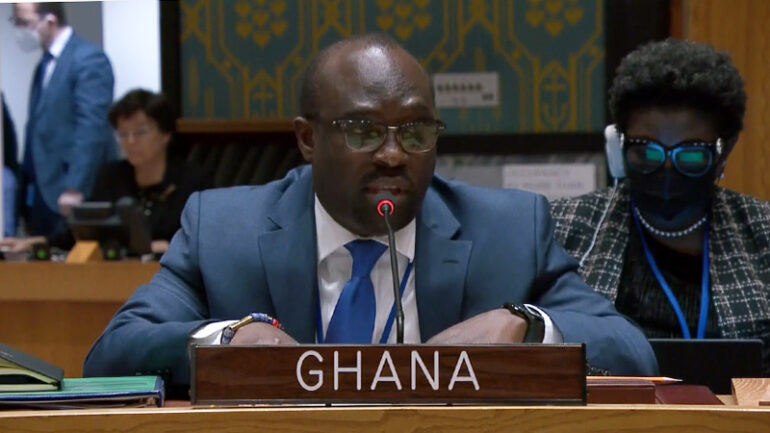Briefing by the Chairperson-in-Office of the OSCE- Security Council

- Posted by admin
- Posted in Statement & Remarks, UNSC
Mr. President,
I warmly welcome to the Council, His Excellency Mr. Zbigniew Rau, the Minister for Foreign Affairs of Poland and Chairman-in-Office of the Organization for Security and Co-operation in Europe (OSCE). I thank Your Excellency for the briefing on the priorities and intended activities of the OSCE for the year 2022 and note that Poland has assumed the leadership of this important organization at a time when the security situation and the politico-military environment in Europe is fast deteriorating. We therefore look forward to the OSCE’s continued engagement and your leadership in helping to address the prevailing security challenges in Europe. I also thank USG Rosemary DiCarlo for her briefing and welcome the participation of the representative of Ukraine in this meeting.
Mr. President,
Ghana takes note of the priorities that have been outlined by the OSCE Chairman-in-Office, in particular the commitment to pay special attention to finding peaceful solutions to the conflicts in the OSCE area and encourage all the efforts intended to be made in resolving the protracted situations in Bosnia and Herzegovina, Georgia, Kazakhstan and Nagorno-Karabakh as well as the alarming situation in Ukraine following the Russian Federation’s unjustified aggression against its neighbour.
We also look forward to the additional efforts that would be made to respond effectively to the complex challenges of increased fragmentation, terrorism, antisemitism, transboundary crimes and violations of human rights and freedoms that Europe is presently grappling with.
Mr. President,
Against this backdrop, I would like to make the following additional points:
First, Ghana welcomes the Polish priority and commitment to uphold the concept of comprehensive and indivisible security based on the Helsinki Final Act and the Charter of Paris for a New Europe as well as other decisions of the OSCE, which also embody the very principles and purposes of the United Nations.
Ensuring security on the European continent today requires of the participating States of the OSCE a renewed commitment to uphold and respect the long-established principles for inter-state relations. The principles of sovereignty, political independence, territorial integrity, non-aggression and the prohibition of the use or threat of the use of force remain the foundational principles upon which national and global aspirations for economic and social development can be built. Any attempts to redefine and renegotiate these bulwarks of stability will not only undermine the European security architecture, but also the rules-based international order and multilateralism.
The OSCE must, therefore, undertake the difficult, but necessary task, of fostering political will and the recommitment of its member States to the implementation of their international obligations towards the peace, security and stability of Europe. Persistence in confidence- and security-building measures among the participating States of the OSCE would have to be sustained.
Secondly, the OSCE’s role as an important forum for dialogue on the security architecture of Europe needs to be re-emphasised. We believe that the OSCE provides a unique platform for open and good-faith discussions among its 57 participating States if the schisms that have opened up in the contemporary European security are to be addressed.
We therefore welcome the on-going efforts by the OSCE to facilitate dialogue between the Russian Federation and Ukraine. As party to the Trilateral Contact Group, responsible for the implementation of the 2015 Minsk Agreement, the OSCE is indispensable in finding and implementing a comprehensive and peaceful settlement of the conflict, which, regrettably, has assumed a full-scale dimension.
We note, with regret, in this context, that the Special Monitoring Mission had to suspend its reporting activities following the evacuation of its international staff members to neighbouring countries and remain concerned by cascading security, humanitarian, economic and developmental impacts of the situation in Ukraine. All efforts towards the pacific resolution of this conflict through dialogue and diplomacy must therefore engender the full support of this Council.
Thirdly, we welcome the OSCE’s efforts to enhance its cooperation with the United Nations. Ghana strongly supports the strengthening of relations between the United Nations and regional and sub-regional organizations in the maintenance of international peace and security.
Chapter VIII of the Charter of the United Nations provides that the Security Council, in pursuit of its mandate can leverage the comparative advantage of regional bodies to promote home-grown and regional approaches to the maintenance of international peace and security.
We acknowledge, however, the complexities that such cooperation entails, and it is for this reason that Ghana is working within the Special Committee on the Charter of the Organization to identify gaps and propose guidelines to enhance complementarity between the United Nations and regional organizations.
Finally, we note the enhanced engagement of the United Nations and the OSCE aimed at finding lasting peace to the prevailing conflicts and growing threats to security in Europe. We welcome the focus on a human-centered approach and, in that regard, take note of the reinforcing priorities within the economic and environment dimension as well as the human security dimension,
I Thank you.
